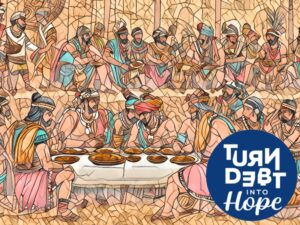Dinner and the gift economy

Jubilee Preaching Aid for June 22, 2025
Readings for the Second Sunday after Pentecost (Year C)
- 1 Kings 19:1-4, (5-7), 8-15a
- Psalms 42 and 43
- Galatians 3:23-29
- Luke 8:26-39
Metaphors and assumptions about debt pervade so much of our lives. Even beyond the economic sphere, we can think of how the idea of being “indebted” to someone is a familiar metaphor, at least in a Euro-Canadian perspective. One of my favourite books addressing debt is David Graeber’s 2011 Debt: The First 5000 Years. Amongst much else, he explains how the idea of paying off our debts quickly and in full is quite a recent and culturally-specific idea. The concept of a gift economy, where people are part of communities and share with one another in a way that is reciprocal and mutual but “repayment” is not immediate or precise, is much more common both historically and throughout various cultures in the world today. He shares the example of how, even in the Euro-heritage cultures of the Global North, we would not think of paying our friends or family for having us over for a meal, but we would likely try to invite them over in the future or do something else to express our thanks and also to keep connecting. Following this, our expression of thanks then likely leads to another invitation of some kind, eventually.
How does this relate to global debt? I think the idea of a gift economy challenges the notion that it is our moral duty to repay whatever we owe precisely and immediately. It reminds us that our ultimate orientation should be toward preserving community and connection, meeting needs as we can and inviting others to do that for us when they can, ultimately strengthening goodwill and a sense of interconnection. We should give not primarily to receive back (or to make a profit), but we can trust that our kindness and offerings may well lead to future gifts when we come into a time of need.
In today’s gospel in the book of Luke about a man possessed by demons, we hear of Jesus removing the demons from him and sending them into a herd of pigs. The pigs then drown themselves and the demons are gone. I always struggled with why these pigs had to be collateral damage in this story. In reflecting on debt, I wonder if it might be in part because it would have been hard for the community, maybe even the man himself, to truly believe the demons were gone if there was not this physical manifestation of their death. Maybe it is also hard to believe that debt, like demons, can or should simply disappear? At its best, a limited sense of being in debt to one another can draw us into community and connection with one another. Like the example of the “debt” caused by a friend inviting us for dinner, it can encourage us to reach back out and reciprocate at a future date, when and if we have something to offer. And, our repayment can take different forms – it would be weird (I think!) to serve the exact meal that someone served us as a way to reciprocate precisely and “cancel the debt.” When it comes to global debt, we need to focus on meeting needs and using the resources we have in service of those needs. We also need to consider how to foster goodwill and mutual connection. Wouldn’t debt forgiveness be the best way to engender a sense of global community and the promise of future solidarity and support? We can see in the gospel story that the man’s healing led him to give back in his own way by telling others the good news about Jesus, perhaps offering healing to others who might later be able to offer their own healing gifts. The gift carries on!
Sheryl Johnson (she/her) is a settler on Ohlone lands in what is colonially known as the San Francisco Bay Area. She is a former KAIROS staff person, now teaching at Pacific Lutheran Theological Seminary.
